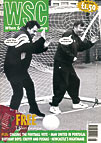 Hooliganism is getting out of control in Holland. Marcelle Van Hoof describes the latest incident that resulted in a supporter's death
Hooliganism is getting out of control in Holland. Marcelle Van Hoof describes the latest incident that resulted in a supporter's death
On Sunday morning March 23rd around 50 Ajax fans met and fought with 200 of their Feyenoord counterparts in a field near a busy main road. In the fight which lasted only five minutes one Ajax supporter, Carlo Picornie, was so badly hit on the head with steel and wooden bars that he died.
The venue for the fight, Beverwijk, was chosen because it was on the way to Alkmaar where Feyernord where due to play later that day. Ajax also had plenty of time to turn up because their team’s away match wasn’t due to start until 6.00 pm. The police were aware that a meeting had been arranged but weren’t exactly sure about the spot, which had been agreed upon through conversations on mobile phones.
It wasn’t the first time the two groups had met up voluntarily. One month before they clashed in the north of Amsterdam when Feyenoord fans were on their way to an away fixture at nearby Volendam, though the only damage done then was to to parked cars and gardens. A week later Feyenoord came to Amsterdam for a league match but security was tight and there were no arrests. Ajax’s next match was due to be in Rotterdam against Sparta but was postponed by the Dutch FA (KNVB) and has yet to be played.
The enmity between Ajax and Feyenoord doesn’t stem simply from the fact that they have been the main championship rivals throughout the century. Just as important is the rivalry between the two cities – ‘working class harbour’ Rotterdam v ‘cultural’ Amsterdam, a difference also reflected in the type of football the two teams play (the hard work of Feyenoord contrasted with the sophisticated skill of Ajax). PSV, far more successful than Feyenoord in the last fifteen years, have never been taken that seriously by supporters of the big two. Although it is not reflected in their support, Ajax are known in Holland as the ‘Jewish club’, a label encouraged by the hardcore fans who shout slogans like “Jews become champions” and carry Star of David flags. Hooligans from other teams sometimes make hissing ‘gas-chamber’ noises when playing Ajax.
The reactions to the clash in Beverwijk were as confused as the event itself. It was clear that a lot of the hooligans were not young or unemployed but grown ups, some in their thirties with ‘respectable’ jobs. The victim, 35 year old Carlo Picornie, formerly a leader of Ajax’s notorious ‘F-Side’, managed a hotel in the centre of Amsterdam and lived with his girlfriend and two children.
Feyenoord chairman Johannes van der Herik said that such events had nothing to do with football and were society’s problem, but his Ajax counterpart Michel van Praag showed more common sense and suggested that the fight couldn’t have happened without football. The Ministry of Justice has suggested that in future football supporters could be classified as criminal organizations if they meet with plans to break the law. This means that the police would have the right to infiltrate the groups and tap their telephones. Future anti-hooligan policies are to be centralized with more use of video cameras and photography at matches and it’s planned that hooligans’ crimes will be registered on a computer database.
On the day of Picornie’s funeral Feyenoord hooligans published an memorial message in Holland’s biggest daily, De Telegraaf, in which they expressed regret at Picornie’s death. Ajax hardcore, meanwhile, say they want revenge.
Picornie’s murderers have yet to be found but I’m inclined to think that his death won’t lead to retribution now that the forbidden line has been crossed. However, the problems remain huge, not least the matter of that re-arranged game between Sparta and Ajax for which a date has still not been found.
In 2000 Holland and Belgium jointly organize the European championships. Most supporters of the Dutch national team come from rural areas and behave in a celebratory way (as they did with Irish and Scottish supporters during the 1994 World Cup and Euro 96) . Hardcore Ajax and Feyenoord fans have tended not to follow the national team but may yet change their attitude should England participate in Euro 2000.
From WSC 123 May 1997. What was happening this month